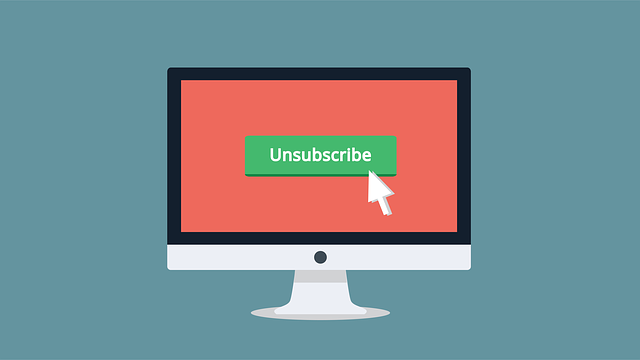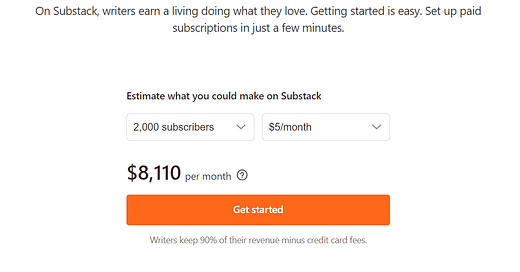

Discover more from Out Over My Skis

If you’re writing on Substack (or anywhere else for that matter), you’re participating in a weirdly asymmetric relationship.
You’re looking for subscribers—but you’re also experiencing the occasional pain of losing subscribers. The two sides of this relationship feel very different.
Getting a new subscriber feels great.
It’s good for the subscriber too: they get to read something new and interesting.
But when someone unsubscribes … well, that feels different.
It’s good for the unsubscriber. They clean out their inbox, take something off their plate, clear the way for something more meaningful.
But for the writer? It can feel bad. Complicated.
You either get an “email disabled” notification (it’s your choice) or you check your subscriber count and find it’s down.
What happened?, you likely wonder. Why did someone decide to leave? Usually, you’ll never know.
I want to dwell on that feeling for a little bit, to think about what it means to unsubscribe, from both sides. (Please take a short survey on your subscription practices—I’ll follow up with results in a future newsletter.)
I got to thinking about this when I was on a group call with other Substack writers. One writer said, “I’m very careful what I subscribe to, because I don’t want to hurt someone’s feelings by unsubscribing.”
I was floored! (And maybe a little impressed by his empathy.)
What do feelings have to do with it?
I unsubscribe from newsletters all the time—albeit at a slightly slower rate than I subscribe, thus my current count of 70+ subscriptions, most on Substack. (Too many!)
Most of the time I unsubscribe because the content no longer resonates with me. It isn’t because the writer has done anything wrong1. It’s just that what they find interesting to write about isn’t really lining up with what I find interesting to read about. Our venn diagrams no longer overlap. And I figure, the best thing I can do is move on.
I don’t unsubscribe the first time I feel this way. My whole point in subscribing is to give the writer a chance to show me what they’re doing. But if after a handful of posts, it’s not resonating, I figure it’s time to say goodbye.
That’s EXACTLY what I want anyone who subscribes to my newsletter to do. If you don’t find that I’m offering a view of the world that you find interesting, or that helps you make sense of your own life, or just makes you laugh or wonder, I hope you’ll take your precious time and spend it somewhere else. Life is too short to read content that doesn’t bring joy—for me and my readers.
I asked other Substack writers how they felt about unsubscribing. Below are lightly edited excerpts from their comments (I put their full responses here, if you’re curious)
Mark DeLong (Technocomplex) writes:
I do wonder when someone unsubscribes, but I get over it in a couple of minutes.
Here’s the thing that I do obsess about: how will an obsession with subscribers influence what I choose to write about. Who, exactly, am I writing for? I hope I’m writing for myself in some manner, while also inviting others to think with me.
Mark Dykeman (How About This) writes:
Maybe the occasional unsubscribe is not such a bad thing. It's a signal that you can't please everyone, a humbling reminder that an audience is earned by every essay, article and story and it's pretty easy for them to move on if they choose. If you're going to write and publish your words to the world, it's impossible to avoid rejection over the course of your endeavours. Best to experience it and gain some tolerance.
As long as flaming sacks of dog turd don't appear in my driveway and I'm not otherwise harassed, I'm OK with an unsubscribe.
Amran Gowani (Field Research) writes:
When I first started on Substack every unsubscribe felt like getting dumped by my middle school sweetheart. Two things cured me of this notion. First, I flipped the script. If content doesn’t resonate with me, I don’t stick with it. Expecting others to do differently is irrational—and narcissistic. Second, I turned off those diabolical “email disabled” notifications. Now I’m blissfully unaware when people move on to greener pastures.
In terms of my own reading, I’m a tough subscribe and a reluctant unsubscribe. I unsubscribe when reading becomes a chore. If I don’t get a little dopamine hit when I see a new story in my inbox, it’s time to move on.
Kris Mole (FDD (Fiction Deficit Disorder)) writes:
I'm never bothered by an unsubscribe.
I've got a feel for who likes what I put out, so they're the people I care about. I prefer that people who rarely open emails unsubscribe as it helps boost the percentage of subscribers who open the content. No point having 50 subscribers if only ten of them are reading your stuff. Get rid!
Bryan Padrick (The Bus) writes:
I've never had an issue with unsubscribing, though I don't do it often. I'm a great believer that writing of any sort is a journey - and you have to trust the author knows what they're doing and where they're going (or at least they appear to).
I feel I have to apply the same philosophy to my reader’s choice. I think there's a danger in worrying too much about why someone leaves - that implies I'm doing something wrong and that might lead to an (even subsconscious) attempt to correct what they didn't like ... but that ignores the fact that many, many more aren't unsubscribing.
That said, teaching has also taught me to never suggest something unless you want it to be acted upon - formal education is largely an exercise in nudging, after all. So ... I just don't mention the u-word. Don't want to plant an idea!2
Brian Reindel (Future Thief) writes:
If the subject or tone of the newsletter changes then I will unsubscribe. Another reason I unsubscribe is when posts become a deluge of how they will post more but haven't had time, and that new posts are "coming soon."
When someone unsubscribes from Future Thief, there is that immediate sinking feeling, but it dissipates quickly. If it was from someone I’ve interacted with, or who has been subscribed for some time, then it hits closer to home.
Bryn Robinson (Campfire Notebook) writes:
My initial reaction is to take it personally, but it’s a fleeting thought. I certainly don’t think poorly of others if I decide to curate my subscriptions.
Graham Strong (To Write with Wild Abandon) writes:
I rarely unsubscribe from anything. If I do, it’s usually because their messaging radically goes against my sensibilities.
I feel irrationally hurt when someone unsubscribes to me. I know it’s part of “the game” if you will. And, as you point out, if someone isn’t getting joy from what I’m writing, they should feel free to Marie Kondo me the hell out of their lives.
I don’t feel personally offended when someone unsubscribes. It’s more like I let them down somehow – I feel like I failed them, not the other way around.
All of the writers included here had a lot more to say, and I urge you to read their full comments here:
You know what feels even greater than a new subscriber? Knowing that someone liked your stuff enough to share it and thought about it enough to comment. So if you liked this—or hell, if you want to get revenge on someone who unsubscribed to your newsletter—hit the button below, or drop a note in the comments.
Except if they complain incessantly about how bad they feel or how hard it is to write. I hate that.
Uh oh, I could be in trouble!















Great variety of comments - thanks for writing this.
Sometimes when I subscribe I'm curious what they will send and say. Often it's not what I was expecting and unsubscribe. Other times it's because I get WAY too many emails from them. If I'm given an opportunity to tell them why I do. On occasion, I also get carried away "decluttering" my inbox and unsubscribe to kinda "start fresh" with other subscriptions.